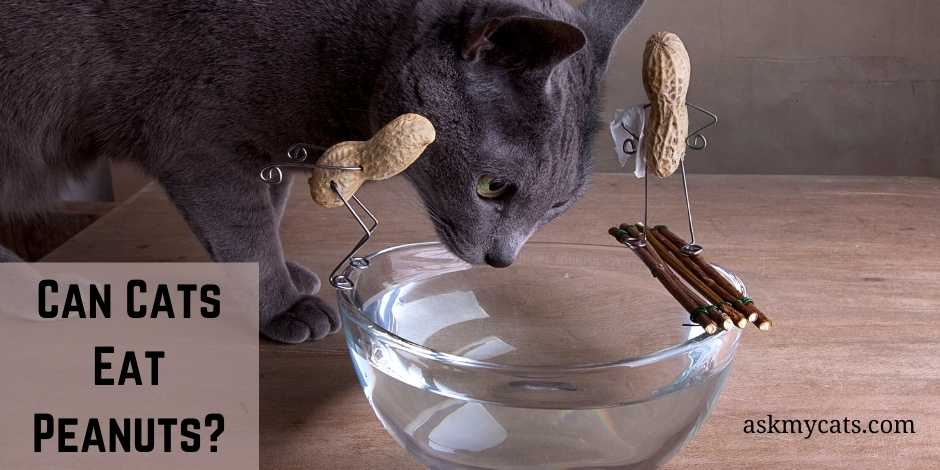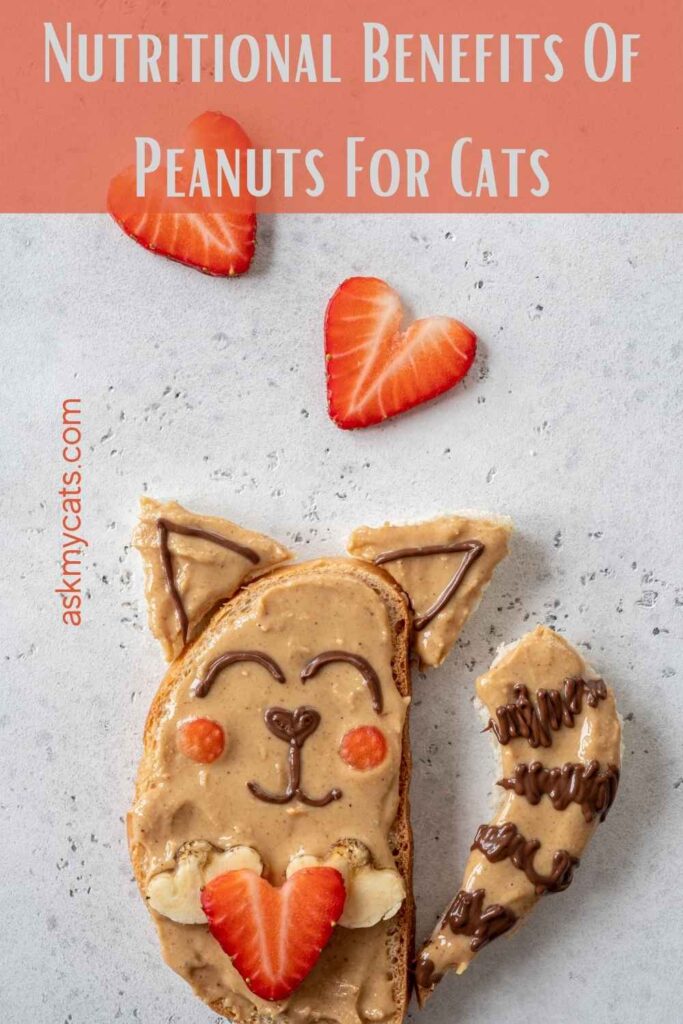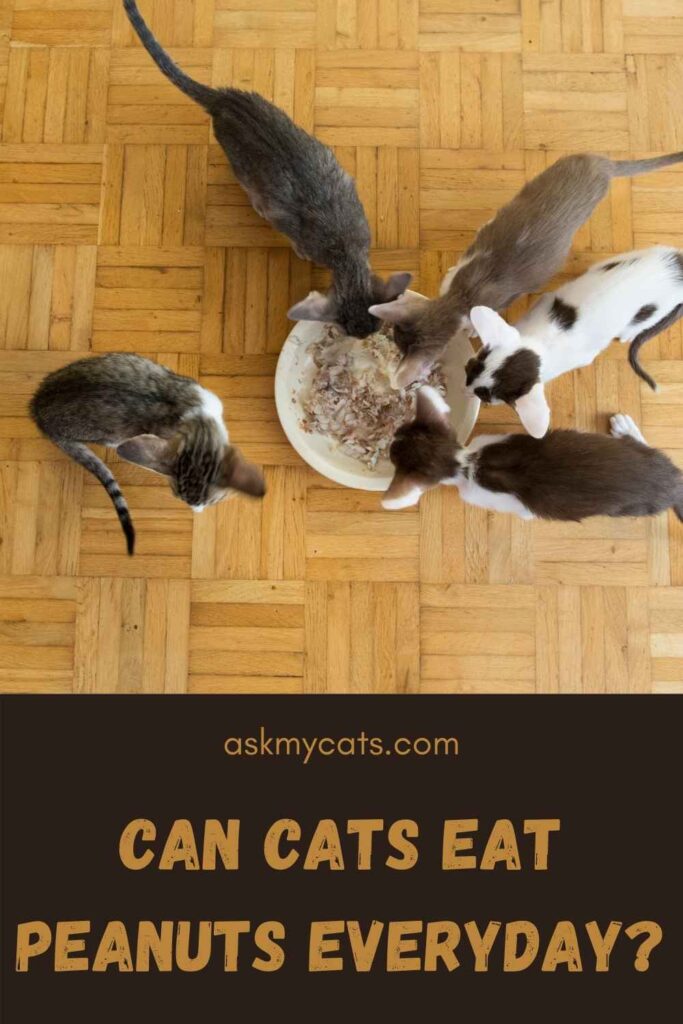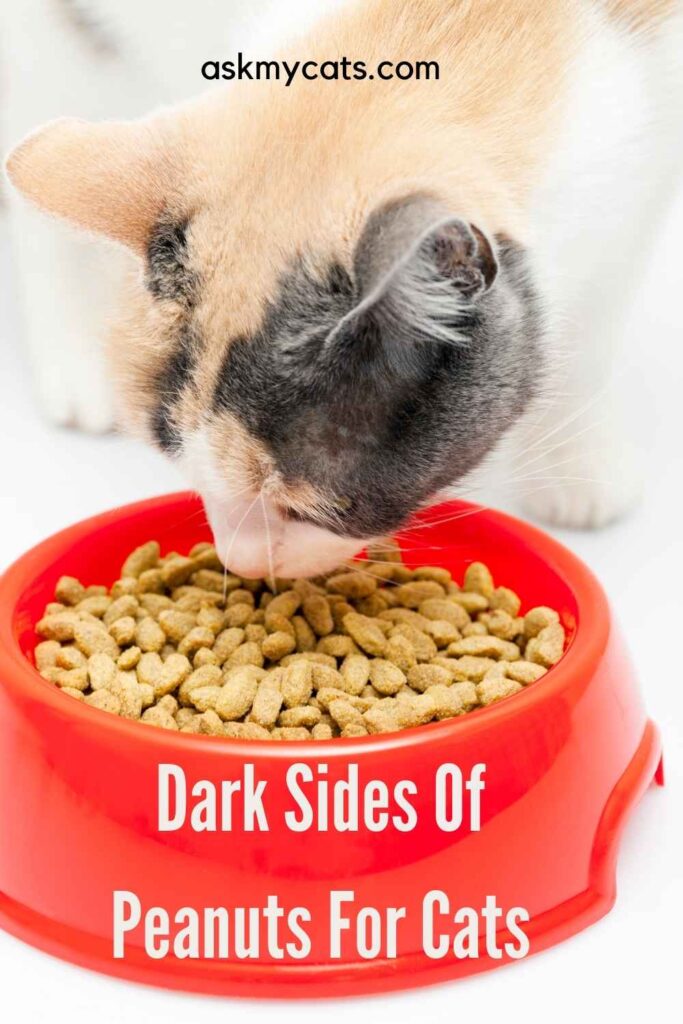When you were eating a package of peanuts, you may have wondered if it was okay to share a couple of these snacks with your pet. Is it safe for cats to eat peanuts if humans can?
Yes, cats can eat peanuts without harming themselves since a lot of nutritional benefits can be obtained from consumption of peanuts.
However, there are few notable exceptions, although there is no dietary justification that you should serve your cat peanuts on a daily basis.
Often consult your veterinarian before feeding human foods to your cat, including peanuts. Here’s what you need to hear about cats and peanuts.


Give Your Cat the Perfect Day
Get the Free Ebook!
How Are Peanuts Good For Cats?
First and foremost, you’ll be relieved to learn that peanuts are not considered dangerous or harmful to cats.
Peanuts, in particular, are rich in protein, and cats are creatures that depend on protein to make up the majority of their diet.
So, following that line of thinking, could peanuts be a fantastic new protein source for your cat?
Unfortunately, it is not the case on a daily basis. This is mostly due to peanuts’ high fat content. And you want to do whatever you can to avoid having to cope with a feline obesity issue.
It’s also worth noting that, as with any human food you’re considering applying to your feline’s diet, you can still check with your usual veterinarian first.
How Can I Safely Give Peanuts To My Cat?
Peanuts aren’t dangerous to dogs and cats and they are safe to be included in their diet. But if you think they’d be a good treat for your pet on occasion and your vet says it’s cool, make sure you serve them up safely.
First and foremost, do use raw peanuts.
The extra salt, grease, ingredients, and seasonings that might be found in a commercial package of peanuts would be harmful to your cat.
Second, make sure you just offer your cat peanuts that have been shelled. What is the reason for this? Since a peanut’s hard shell might end up being a choking threat or a toxic irritant for your cat.
What Are The Nutritional Benefits Of Peanuts For Cats?
Peanuts are not poisonous to cats, but there are a few things to keep in mind when feeding them to your pet.
Peanuts have a high protein content, as well as vitamin E and biotin, while having a low carbohydrate content. The issue is that the proteins in peanuts are insufficient for cats, even though they need a high level of protein in their diet.

Peanut is the best source of protein since it provides a unique combination of amino acids, like taurine, which is one of the most essential.
While Vitamin E and biotin are beneficial to the health of the cat’s connective tissue as well as the health of their fur and skin, there are more effective sources of these nutrients.
The truth is that once you give your cat something to eat, such as peanut butter, he is unable to try the taste experience on his own.
If you just want to feed your cat peanuts, make sure they’re raw, because the other kind might have a lot of salt or other additives.
Even, don’t give your cat peanuts on a daily basis. Using them as a treat only, as they can cause liver harm or obesity if consumed in large quantities is a very good idea.
Even, never offer your cat chocolate-dipped peanuts, since this is very poisonous to them. Be sure you get rid of the shell as well, as it can damage your cat’s digestive system.
Peanuts are a poor choice since they contain a high proportion of sugar, which can lead to obesity in your pet if eaten in significant amounts, as well as heart disease, cancer, arthritis, and diabetes.
While peanuts may not contain something harmful for cats, they are an unhealthy choice in general; certain cats can exhibit allergy symptoms.
If your cats faint or have diarrhoea after eating peanuts for the first time, it’s more likely that they can’t stomach them. This does not actually imply that they are allergic, but it does indicate that they may need some time to adapt to the new food.
Itching, swelling, or sneezing are common allergy symptoms, and if you notice either of these, you should stop trying to introduce peanuts to your cat.
Can Cats Eat Peanuts Everyday?
Cats can eat peanuts regularly but technically, it should not be done or else stomach upsets may occur in rare cases.
The peanut is by far the most common shelled food in the United States. Peanuts account for more than two-thirds of all nut intakes, according to the Peanut Institute, which is a true organisation.

Before you get all nerdy and check your favourite plant encyclopaedia, keep in mind that most people use the term “nut” for the sake of convenience. Peanuts are legumes rather than genuine nuts.
One distinction is that most common nuts, such as almonds, pecans, and pistachios, grow on and are harvested from trees.
Legumes rise just above or, in the case of the peanut, just below the layer. Peanuts are highly valuable and nutritious nuts, regardless of their particular nomenclature.
Given that peanuts aren’t commonly advertised in pet food or treats, taking the time to study their effects on cats makes sense. Protein is an essential part of a cat’s diet, so cat food and treats need to be rich in it.
Cats rely on protein for nutrition during their waking hours because they spend too much of their time sleeping. Peanuts have the highest protein content of any nut in terms of weight. So far, it has gone well.
Peanuts, on the other hand, have a disproportionately large volume of sugar. While peanuts contain a healthier kind of fat called monounsaturated fat, the digestive system of cats is not designed to break down or handle large amounts of fat.
Cats are not adept at digesting plant matter, but they do consume grass on occasion. These are both strikes against cats and peanut eating, despite the fact that cats are not poisoned by any portion of the peanut.
If you want to feed a peanut to your cat on National Peanut Day, I recommend the following serving tips.
- Begin with small portions: Since peanuts are a rare food for cats, try one or two to begin with, preferably diced or chopped to make chewing easier.
- Raw: Cats, including fats and plants, are unprepared to cope with salt or other ingredients, such as sugar, and should resist chocolate-covered peanuts at all costs.
- Unshelled: The rough outer husk is especially harmful to a cat’s digestive tract, and a stray piece of peanut shell fragment on the way out could do much more damage.
Can Cats Eat Peanut Butter?
The short answer is yes, but only to a certain extent because peanut butter isn’t poisonous to cats, but it’s not really healthy for them.
Cats are obligate omnivores, which mean that, unlike a dog or a human, their bodies are not designed to eat a lot of plant matter.
Despite the fact that peanut butter is not on the ASPCA’s list of poisonous foods, it can only be given in limited amounts as a reward or as a means of getting your pet to take medicine.
Images and pictures of dogs chewing peanut butter provide us with a great deal of laughter and fun.
Surprisingly, when studying whether cats would consume peanuts, I came across very few videos or photographs of cats consuming peanut butter.
Cat owners are generally aware that cats have fairly normal feeding habits and are not as adventurous about their palates as dogs.
Until you offer a cat something to eat, such as peanut butter, she is unable to investigate the flavour on her own. If you would, give your cat peanut butter that is sodium-free and as low in sugar as possible, just as you can for peanuts.
Peanuts include “healthy fat,” which has some important health benefits for humans, but it’s a different storey for our feline companions.
Cats’ digestive processes are carnivorous, and they handle certain “normal foods” differently than we do. Some diets are harmless or even helpful to a cat’s diet, while others exacerbate gastrointestinal problems with long-term consequences.
Nuts and nut butter are rich in calories, but even though your cat would eat them, don’t feed them too much.
It’s also worth noting that peanut butter is often used as rat bait. If your cat goes outside on occasion and sees peanut butter on one of these traps, they fear being harmed by the trap or inadvertently ingesting poison.
Peanut butter is a food that can be used in a variety of ways. For others, it’s a good source of protein to help them lose weight, while others, such as bodybuilders, like peanut butter because of its high caloric content. It aids in the development of muscle mass.
Zinc, potassium, magnesium, and vitamin B-6 are also important vitamins and minerals found in peanut butter.
The protein content, on the other hand, is much more essential. Peanut butter contains over seven grams of protein in just two teaspoons. That’s the equivalent of an egg in terms of protein.
Adding more nuts to people’s diets, such as peanuts and almonds, has been attributed to a lower risk of heart failure in some research. Peanut butter seems to be an excellent contribution to our lives.
Dark Sides Of Peanuts For Cats
Peanuts are not harmful to cats, but they can be hazardous for a variety of reasons.
Peanuts are high in protein, which cats require; however, nuts are also high in fats, which cats can find difficult to digest.

If your cat eats so much peanuts, it can have stomach problems, including vomiting or diarrhoea.
A peanut or two is usually not enough fat to cause concern, but your cat should not eat a lot of peanuts in one sitting, or even on a daily basis, to avoid consuming too much fat.
Cats are naturally picky creatures. Anyone who has a cat or has spent enough time with one can understand. They are animals who like what they like and become creatures of habit, including their eating habits.
Cats are also carnivores, and meat is their primary source of protein. They aren’t herbivores and don’t want to be, until they eat a bit of grass outdoors every now and then to calm an irritated stomach.
Apart from that, there isn’t anything that tempts a cat’s palate, which is somewhat different from a dog’s, which appears to want to eat whatever it can get its mouth on.
However, for some cause, certain pet owners are still trying to give their cats a taste of something other than their cat food.
Peanuts are a treat that certain cat owners may be interested in knowing whether it is healthy for their pets. If a cat owner wishes to share their peanuts with their cat for whatever reason, it is wise to know ahead of time if a cat will eat peanuts or whether they are deemed dangerous to cats.
The bottom line is that cats are legally allowed to eat peanuts. They aren’t called a cat’s poisoned food.
Peanuts, once eaten raw, are rich in salt, which is bad for kitty. If you want to give your cat a peanut treat, fresh, unsalted peanuts are the perfect choice, and they should be unshelled.
If your cat consumes peanut shells, the shells can be difficult to digest and even toxic. They splinter and can splinter into fragments that can cut the throat, digestive tract, and stomach lining.
Frequently Asked Questions
Can peanuts be poisonous?
To summarise, raw peanuts are healthy to consume, and the many health advantages of peanuts and other tree nuts much outweigh the dangers. Often, consume a diverse diet to enjoy the health advantages of different ingredients while limiting toxicity exposure.
Why are peanuts not good for your cat?
Although much of the fat in peanut butter is good for you, peanuts do contain saturated fat, which can cause heart attacks if eaten in large amounts over time. Peanuts have a lot of phosphorus, which will prevent the body from absorbing other minerals like zinc and iron.
Final Words
Despite the fact that cats are not poisoned by peanuts, there is little advantage of feeding them peanuts. If your cat eats stray peanuts on occasion, he or she will most likely be fine with just one or two.
However, make sure you pick up some drop peanuts that contain seasoning, chocolate icing, or candy, as these can be harmful to your cat.
Have you seen your cat attempting to eat your peanuts? Have you ever safely given your cat a pair of peanuts?
Let us know what happened in the comments section below!
